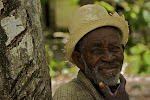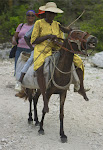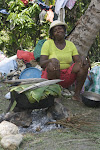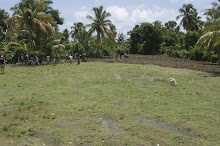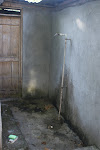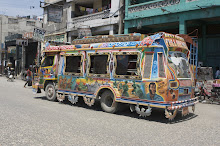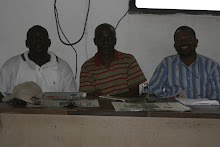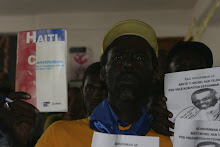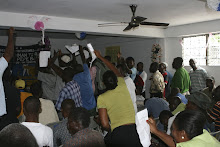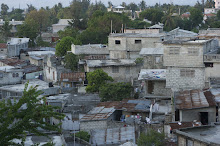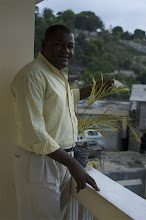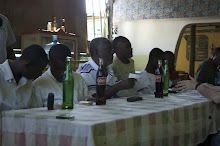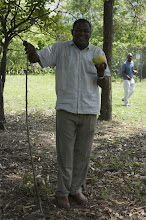Today we met with Paul Philome of the Batay Ouvriye, which translates as "Worker's Battle," a radical left coalition that coordinates workers, artisans, peasants and community organizations. Their biggest presence is in the north of the country, particularly in Cap-Haitian, where they organize workers in the free trade zone factories, most of which make apparel and things like baseballs.
Paul began by describing the difficulties the BO is facing with mobilizations. Their April 15th mobilization was blocked by the police, despite the fact that the Haitian Constitution specifically states that workers need only warn police of an upcoming demonstration, not ask permission. Finally the demonstration occurred on April 22nd, but the turn out was significantly smaller because of the change of dates. Their planned May Day actions in Port-au-Prince and Cap-Haitian have also been blocked, though the BO plans to go ahead with them regardless. When asking for more details Paul warned us against attending either of these as there are likely going to be confrontations with the authorities.
At that point we asked if we could film, but Paul declined, telling us that the authorities periodically clamp down on the BO and that images and interviews have been used against them. The government has blamed the BO and its leadership for vandalism and unrest and Paul stressed the importance of caution. We agreed not to film and took notes instead.
Paul then described his basic ideology of consciousness raising, advancing the workers' struggle, and accusing the Haitian government of being the lackeys of the employing class. He stated that the working class in Haiti has come to an impasse, where their misery is not only allowed but actually enforced to keep wages low and working conditions poor to maximize profits. As a result the authorities have an active stake in repressing the labor movement and have used paramilitary forces to repress workers. According to Paul this requires a radical reorganization of society to break down the walls that imprison the working class and to bring about a revolution, to "sever the umbilical cord" that connects the state to the people. The only question, for Paul, was "is there enough political consciousness to restructure society?" He believes that there is, particularly with the current unrest which forces workers to "remove the wool from their eyes."
He then went on to describe the legal obligation, within the Haitian Constitution, to raise the minimum wage to keep up with inflation. This promise has never been kept. The only adjustment to the minimum wage was over five years ago and was only a 5% increase despite 10% increase to the cost living. He said that inflation has now reached 100% or more. Given the dire situation, and lack of help from the state, the struggle has moved into the streets and the consciousness of the people has been raised to a point where radical change is possible.
When discussing similarities between the IWW's philosophy and that of the BO we recognized that neither of our organizations takes an official position in electoral politics. Paul told us that the BO will have relationships with some politicians who are part of their organization, when it can help the struggle, but will not support candidates. He then told a story of one of the BO's supporters who ran for senate because he believed that he could take the workers "fight" there, but was shot and left for dead by assassins and was forced to flee the country. He has since returned to Haiti and serves as the BO's attorney. Paul also mentioned that he himself had been shot in the leg, but differentiated between the authorities "shooting to deter" and "shooting to kill." He was only "shot to deter."
According to Paul the minimum wage is about $1.75 per day, which is supposed to cover transportation, gas (which in Haiti is about $5 per gallon), and meals. This leads to workers needing to take a shot of cheap, home made liquor at lunch, in place of a meal, to give them enough energy to get through the rest of the day. This has led to "le vie de clorox," or the life of bleach, which refers both to starvation pains and a means of suicide. One of his friends, Manu, had killed himself by drinking a bottle of bleach.
He believed that the wage worker has direct contact with capitalism, not the peasant or the artisan, and therefore it is the wage worker who must lead the revolution.
Paul had done extensive research on the IWW's website (www.iww.org) and had several questions for us. The first question that he asked was "why are you here?" We explained that our International Solidarity Commission had made contact with the CTH who invited us to Haiti in order to document the effects of neoliberalism. We also told him that is was our goal to help coordinate support, both material and in the form of solidarity, to help the struggle of Haitian workers, and finally in order that we might learn from the Haitian situation how to further our own struggles. He asked us three further questions about the IWW's philosophy, structure, and tactics which we decided to go into greater detail on in a later meeting.
While driving us back to St. Joseph's he told us how Venezuela donated asphalt to Haiti for the construction of roads (a much needed and missing part of the country's infrastructure as indicated by our trip to the Central Plateau) but that the government of Preval turned around and sold the asphalt to the Dominican Republic for their own profit. Also that the gas that Chavez gives is sold for profit as well.
Paul also invited us to a conference on organizing in Latin America which is being held by a group called ELAC (www.elac.org.br) which stands for Encuentro Latino Americano y Caribeno de Trabajadores. It's being held in Minas Gerais, Brazil on July 7th and 8th.
Wednesday, April 30, 2008
Tuesday, April 29, 2008
4/29
This morning we went to a press conference related to the unjustified arrest of Levy Mileot, president of the hospital union. Afterwards we stopped by the CTH office where there was a conference held by the Assocation des Employes Victimes de la Teleco, over 5000 of whom have been laid off since 2004 when the privatization of TELECO began. They were left with only a 12 month severance package and are demanding an extension to 36 months based on the precedent set by the public concrete and flour companies which were also privatized. There are accompanying demands such as medical coverage, money for children's schooling, microcredit loans, professional training, and elimination of workers' debts. They are planning a protest on May 1st in conjunction with civil society to which our delegation has pledged its support as a tactic to pressure the Haitian government (and the North American neo-colonialists) from reversing the privatization of the public sector.
We next met with representatives from the EDH (Electicite d Haiti) the state electrical company, in particular Hary St. Felix, General Secretary of the Federation of Workers Unions of the EDH. The EDH is the next target for privatization following the neo-liberal model. Hary stressed the idea of pushing for a 3 year severance package for the soon to be laid off workers. He proceeded to explain the working of the electrical union and how the production of power took place in three different stages: Production, transportation, and commercialization. The problem in this process is practical-- how can you furnish the necessary service. In fact 75% of Haitians lack electricity as witnessed in Hinche and even in PAP where there are 3 hours or less of power a day. The EDH would like to have sustainable energy created (solar, wind, hydro) but the state is not interested in exploring these alternatives.
There are 2500 EDH employees, each of which support roughly 10 dependents. In October 2007, before the food crisis, the union did a study that concluded that the salary needed to bring a family of 4 up to the poverty line is $450 a month. This only includes 2 meals a day, and does not include the cost of schooling and health care, both of which are now private. However, the average salary of an EDH worker is only $80 a month. Keep in mind there are only 200,000 formal sector jobs so if 2,500 EDH workers are laid off it effects over 25,000 individuals.
The EDH is involved in both production and delivery. There is also a private firm that only produces electricity and refuses for the moment to involve itself in delivery and collection of payment from individual customers because there is such a problem with theft. Apparently, of all the electricity that is consumed in the country the EDH receives payment for only 50% of it because people at all levels of society are illegally tapping into the electrical lines. Of course this only includes those who have access to the electrical infrastructure in the countryside and the shanty towns where there is no infrastructure there is no "theft." The EDH has asked for proper funding to improve its bill collection and infrastructure improvement, but this has fallen on deaf ears.
To date the government's argument for privatization has been that the public sector operates at a loss, however the evidence suggest that this is due to underfunding. The union believes that this is a deliberate strategy to justify handing over potentially profitable public sector industries to corporations.
In contrast, Venezuela and Hydro Quebec have proposed a cooperative agreement which would see to the construction of several power plants around the country. Venezuela in particular will be constructing 3 power plants, one in Gonaives, one in Cap Haitien and one in Port-au-Prince. They are being built in the spirit of cooperation and not competition; the Venezuelans will provide their own technicians to get things up and running, but they will be training Hatians to replace them, thereby providing Haiti with electrical sovereignty. In addition, Venezuela provides Haiti with 14,000 barrels of oil a day, 60% of the cost is paid now while the remaining 40% must be invested in state infrastructure and repaid in 25 years time.
According to the EDH union representatives, President Chavez of Venezuela does not promise aid, he gives it as opposed to the United States, Canada and Europe who only promise but never give. Our personal experience confirms this as we have seen the tangible aid from Venezuela as opposed to the constant and intimidating U.N. military patrols. Furthermore, a medical university that Cuba helped establish in Tabarre has since been closed and is now occupied by the U.N. and is used as a military base.
Currently the EDH is striking in order to get the promised 35% raise in salaries to deal with the increased cost of living. This was promised in March but has yet to be realized. While taking a break from our meetings we heard singing in the adjacent room. We went to listen and saw that it was the union representatives, Hary Saint-Felix and Pierre Nadal, singing solidarity songs, which described how the union fights not just for the betterment of its members but also for the betterment of the whole country. They said that songs demonstrate that union members walk not with the heads down but with their heads held high, they don't walk alone, but with each other. By betterment they are referring to socio-economic and political conditions as well as to working class culture. Song is a concrete expression of solidarity because we sing together a common understanding and goal. Our cameraman Nathaniel returned the favour, leading in the singing of "Solidarity Forever."
Monday, April 28, 2008
4/27 - 4/28
Yesterday we took the day off and went to the beach with Paul and Jeanette. On the way we drove briefly through Cite Soleil, the Port Au Prince slum from which Aristide drew significant support. We witnessed shanty towns with corrugated metal roofs slapped up on top of garbage dumps along toxic streams. On the outskirts was the Duvalier prison, Dimanche, which was destroyed after the dictators' fall. From the slum we saw the apartments Aristide began to build for the poor, some were completed but the project was never finished due to the 2004 coup. Proceeding toward the beach we crossed PAP's largest market, which is being replaced by permanent structures funded by Venezuela, an example of real international solidarity. Contrast this to the UN which is basically an occupying power driving through PAP in armored personal carriers brandishing guns.
We witnessed other dramatic contrasts, on one side sat the slums, while on the other the National Theater and embassies, including the old US embassy, replaced just last week by a fortress near the airport. Thus the architecture tends to confirm the statistic that 85% of Haiti's wealth controlled by 6% of the population (ironically the richest billionaire in Latin America is Haitian, and Haiti has the most billionaires in the Caribbean). Leaving the market area we saw a few of the remaining Creole pigs drinking and eating in the sewer. Creole pigs were forcibly eradicated in 1982 and replaced by pigs imported from Iowa, dubbed by peasants "prince a quatre pieds" (four footed princess) as they required a higher standard of living than most Haitians, needing clean drinking water unavailable to 80% of the population, vaccinations, special imported feed provided by US agribusiness, and special roofed pigpens.
The beach was lovely, though catered mostly to upper class Haitian youth, costing more than most Haitians live on in a day. It was quite a contrast being the only white people on the beach. The water was lovely, warm, and refreshing.
Today we visited PAP's docks, where the CTH has a presence with the Syndicat de Employes de Lautorite Portuiare Nationale (SEAPN- National Dock Workers' Port Authority Union). We had a meeting with the union's president and 7 committee members. We learned that the docks have 1800 employees, 1275 are union members, 1300 of which are about to be laid-off. According to those we interviewed the SEAPN is "apolitical," doing social instead of ideological work.
The union's main focus is working with the employees, making sure they keep their jobs and that their rights are defended. They stressed they have a "new union philosophy," to work in collaboration with the Port's director to obtain a better severance package for the workers. Their focus is to "modernize through diplomacy to present the problems of workers to management." Unfortunately, there is now a crisis between the union management and the government; the State has decided to lay off 1300 workers and the union, not opposing the layoffs, is focusing on obtaining a 2 year severance package with 6 months health care beyond that. They also talked about professional training to manage the money they receive and initiate "income generating activities through new economic initiatives" (through the informal sector?).
This reveals a tension between the CTH and the SEAPN as the CTH remains opposed to this kind of privatization and is trying to organize national and international opposition to the move, which is one example of how badly they require our solidarity. There is no opposition to the layoffs in the Haitian government in fact the port director and "civil servant", Jean Evans Charles, a hatchet man, after 2 hours of pontificating stated "we are capitalists, we have to make money in a competitive system, and the best way to do this is to privatize." What will the layoffs be based on -- seniority, age, family? -- we did not get a clear picture.
When asked about the UN's Universal Declaration of Human Rights (guaranteed to all people, the right to work, education, food, clothing, shelter, and to live a life of quality in a democracy), Charles repeated the Reaganite doctrine of trickle down economics. Interestingly, no one from the SEAPN was listening to his spiel, instead they talked on their cell phones, engaged in non-verbal communication with us, and one even fell asleep.
As we left the port some Haitians shouted at us "CIA, CIA fuck off," alluding to US cooperation with the port's privatization. We proceeded to the Parquet, a local courthouse, where hospital workers who had not been paid for 7 months were standing in solidarity with the president of their union who had been arrested after an altercation between some union workers and the hospital's director. The union president, Levy Mileot, was not even present at the incident. In a crowd surveyed by plainclothesmen who carried M16s and shotguns we learned that on March 15 a 35% increase in hospital worker pay had been approved but has yet to be implemented.
We interviewed several members of the hospital workers union who denounced not only corruption in the health care industry, but also launched into attacks on bureaucracy, clientelism, systemic violence and corruption, and anti-unionism. By 4:30 the judge had not shown up for the hearing. Shortly thereafter Mileot was whisked away amid the outcry of the 30 or so there in solidarity.
Sunday, April 27, 2008
April 26, 2008 (Third Day)
We started the morning by being interviewed by at least 10 members of the local press who questioned us on our objectives. We explained that as citizens of Canada and the US (the two main countries behind the coup and the neoliberal/privatization policies) we felt a moral and democratic obligation to document the living and working conditions created by our governments' foreign policies, and to bring that information back to our fellow citizens with the hope that this will compel them to mobilize for social justice.
Our final stop was in the countryside where we met with peasant groups affiliated with the CTH. Interestingly enough the meeting was held in a building used to raise pigs. At the time it was empty, but again due to a lack of resources it was the only structure available for the meeting. One telling part of the meeting was when the delegation asked them whether they have received any of the international aid our governments claim to be giving to Haiti, the question was met with a resounding and unified NO!
The farmers explained that the peasants are the motor of the economy because without food there is no work. They actually sang a song which dramatized this point. Subsequently the attendees elaborated six main points to improve agriculture, which would improve the quality of life for children, women, and men throughout Haiti:
- Food
- Health Care
- Education and job training
- Decent housing
- Dignified work
- Leisure time.
In short the peasants and peasant organizers displayed a profound political consciousness when they explained that the US and Canada did not want Haiti to be politically or economically independent because the people would use their independence to develop and redistribute the resources of the country for its people.
April 25, 2008 (Second Day)
We left Port-au-Prince to visit the countryside, more precisely the Plateau-Central, the poorest region of Haiti. The road that led us there was indicative of the state of the country, as it resembled a mountain riverbed as opposed to a smooth paved highway, much like the life of your average Hatian. En route we passed Peligre Dam designed and built in 1950 to provide electricity to factories in Port-au-Prince, but not for the people of the region. Currently it only provides on average 3 hours of electricity per day, and only to those who can afford it.
As we progressed along the so-called road, we witnessed acute poverty in the form of shanty homes built of scrap wood/metal, roaming goats and chickens, sparse vehicles loaded with mangoes, bananas, and people in the room that was left, many of whom were scantily dressed. Most of the people we witnessed along the road were simply waiting in front of their homes. Others were involved in the mango harvest using boney horses and donkeys to transport the produce.
We arrived in Hinche, the capital of the Plateau-Central, where we met with regional coordinators of the CTH, none of whom are paid for their union work. They explained the conditions within each sector they represented: Commerce, cooperatives, journalism, construction, youth work, transportation, women's issues, agricultural workers, professional artisans etc. And then each sector went into great detail as to what their problems were. The overwhleming obstacle was a complete and utter lack of infrastructure, such as means of transportation for their products, financial assistance to propel growth, irrigation, modern tools, local places to meet, schools, drinkable water, electricity, hospitals, social security or services, job training, child care, etc..
For the 55,000 people on the plateau, one of the only recourses is to work in the sugar can fields of the Dominican Republic for starvation wages, under conditions of extreme discrimination. The only other recourse is to go to Port-au-Prince and attempt to join the informal economy. For many women this means prostitution, and for many men this means unemployment, begging or petty crime.
April 24, 2008 (Our First Day)
We were hosted by Paul "Loulou" Chery, the general secretary of the CTH. We visited the main building of the CTH, INAFOS (the National Institute for Social Training) where they used to train members in foreign languages (Spanish, English and French) as well as cadres that would go to the countryside to help organize for the union. The union has been suffering a low period over the last 5-6 years and the builiding has fallen into disrepair due to a lack of resources. They are in need of $25-30,000 for renovations and also need a steady income of $4-5,000 a month for operational costs. For the moment some of the space is being rented to other organizaions who need limited space.
Some Background
The IWW was invited by the CTH (Confederation des travailleurs haitiens, Confederation of Haitian Workers) in the hopes that we would learn exactly what work they have been doing in Haiti since 1959 and the difficulties they have encountered under the Duvalier dictatorships and the recent tyranny of neoliberalism. Ultimately the CTH hopes the IWW will be able to help in material aid and help in forming links of solidarity with other anti-privatisation organizations.
History and Evolution of the CTH's perspective.
In 1959 the CTH was founded by Christian workers who were working in sweatshops during the dictatorship of Duvalier. Many of these members were tortured, killed and forced into exile for their union activity. But a small cadre remaining in Haiti went underground. They focused on two objectives: organizing a country-wide union, and resisting the dictatorship of Duvalier. However with the first democratic elections in 1990 the CTH emerged as a union active in advancing the interests of workers: good jobs, improvement of living conditions, quality of life, and grassroots changes of the country. Since the overthrow of Aristide in 1991, the CTH has had its ups and downs, from strong influence with workers to a crisis that has challenged its very existence. Following the coup d'etat of 2004 the CTH has been struggling to rebuild. Paradoxically it has been reinvigorated over the past two weeks during the food crisis that has caused average Hatians to take to the streets and protest militantly against the the privatization policies which led to the tripling or quadrupling of the cost of living. In this context the CTH is demanding a constitutional role for unions and union members. The current president Rene Preval seems receptive to this idea.
Haiti has officially 8.5 million inhabitants, but in reality closer to 10 million (with another 4 million living abroad mainly in the US and Canada). While it has an active workforce of 7 million there are 200,000 formal jobs of which 50,000 are in the public sector and 150,000 in the private sector. However the government is in the process of cutting public sector jobs with great strides as is the private sector.
Tuesday, April 22, 2008
The IWW Mission to Haiti
The International Solidarity Commission of the Industrial Workers of the World is sending a delegation of five workers to Haiti to meet with labor groups and observe conditions in the country. We'll be there from April 23 to May 5, 2008. This blog will record the delegation's experiences and impressions.
Subscribe to:
Posts (Atom)


